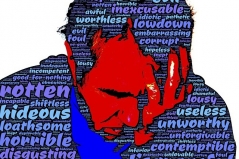Re-thinking how we think about conformity
keywords:
cross-cultural psychology / socio-ecological approach / relational mobility / culture / pen choice / open and closed cultures
Re-thinking how we think about conformity
In this post, I recount part of my journey into the nitty-gritty of cross-cultural differences in behavior. More specifically, I discuss the link between skateboarding across the USA, attractive Japanese women in tights, and the paradoxical nuances in conformity between cultures. / more
On Scaffolds and Sweet Potatoes
keywords:
culture / evolution / macaques / scaffolding
On Scaffolds and Sweet Potatoes
One of the most simplest things ever made was the scaffold. Thinking about its consequences however has recently opened up a world of possibilities for scientists that might lead to new ways of thinking about culture, the human mind, and their development. / more
Do Multicultural Experiences Make People More Creative? If So, How?

keywords:
creativity / culture / McDonald / multiculturalism / Starbucks
Do Multicultural Experiences Make People More Creative? If So, How?
MacDonalds' Rice-burger in Asia; Starbucks’ Coffee Mooncake in Singapore; Disneyland Yin-Yang Mickey Mouse Cookies in Hong Kong; Lay's Peking Duck Flavored Potato Clip … The list can go on. What is common in all these examples is that they are all novel product ideas created by integrating seemingly non-overlapping cultural or product ideas from Eastern and Western cultures. / more
Penetrating the Circle of Death: Why People are Dying (and Killing) Not to Die

keywords:
culture / death / mortality / terror management
Penetrating the Circle of Death: Why People are Dying (and Killing) Not to Die
Martin Luther King Jr., the social activist who represents for many the ideal of a meaningful life, foreshadowed his own assassination when he said, "A man who won’t die for something is not fit to live." These words may resonate with us, but Woody Allen spoke for many of us as well when he said, "I’m not afraid of dying – I just don’t want to be there when it happens." The idea of death occupies a unique place in our minds: it is both the sum of all fears and a kind of golden standard by which we measure an individual’s commitment to an ideal. We honor and understand King Jr.’s sacrifice insofar as almost all of us possess ideals for which we believe we would give everything, whether it’s the love of our children, fighting oppression in a foreign country, or protecting our personal freedoms. Yet we empathize with Allen because death seems like a terrifying and unfair fate for us, instilled as we are not only with drives toward self-preservation (we seek food when hungry, react quickly to external threats), but also an advanced consciousness that harbors love and a fear of loss for many aspects of our lives. / more
Culture and Health Psychology: Insights from a Socio-Cultural Perspective
keywords:
collectivism / culture / health / individualism / well-being
Culture and Health Psychology: Insights from a Socio-Cultural Perspective
The beginning of the 20th century featured an understanding of health that was dominated by a biomedical perspective, characterized by a reductionist point of view in which health was defined as the absence of illness. This view has long been replaced by a biopsychosocial model that emphasizes the role played by socio-cultural forces in the shaping of health (and illness) and related psychological experiences (Engel, 1977). In 1948, the World Health Organization (WHO) defined health as... / more
The Role of Honor and Culture in Group-Based Humiliation, Anger and Shame
The Role of Honor and Culture in Group-Based Humiliation, Anger and Shame
Imagine that your national football team has to play against the team of a neighboring country. You are very excited about this event and invited your friends over to watch the game together. When the other team scores a second goal and is winning, you see that the football fans of that team are burning your national flag in the stadium. How would you feel, if that were to happen? What would you think about the... / more
Honor and Emotion
keywords:
culture / emotion / family honor / morality
Honor and Emotion
This paper discusses honor and its effects on emotion. The paper is divided into two parts. In the first part, the definition of honor is discussed. This section answers the questions ‘what is honor,’ and ‘are there different types of honor?’ Later, there is an overview on the ways in which honor influences emotional experiences and expressions. Throughout the paper, conclusions are reached based on honor and emotion research in Mediterranean, Northern European, North American and Middle-Eastern cultures. Imagine as... / more

